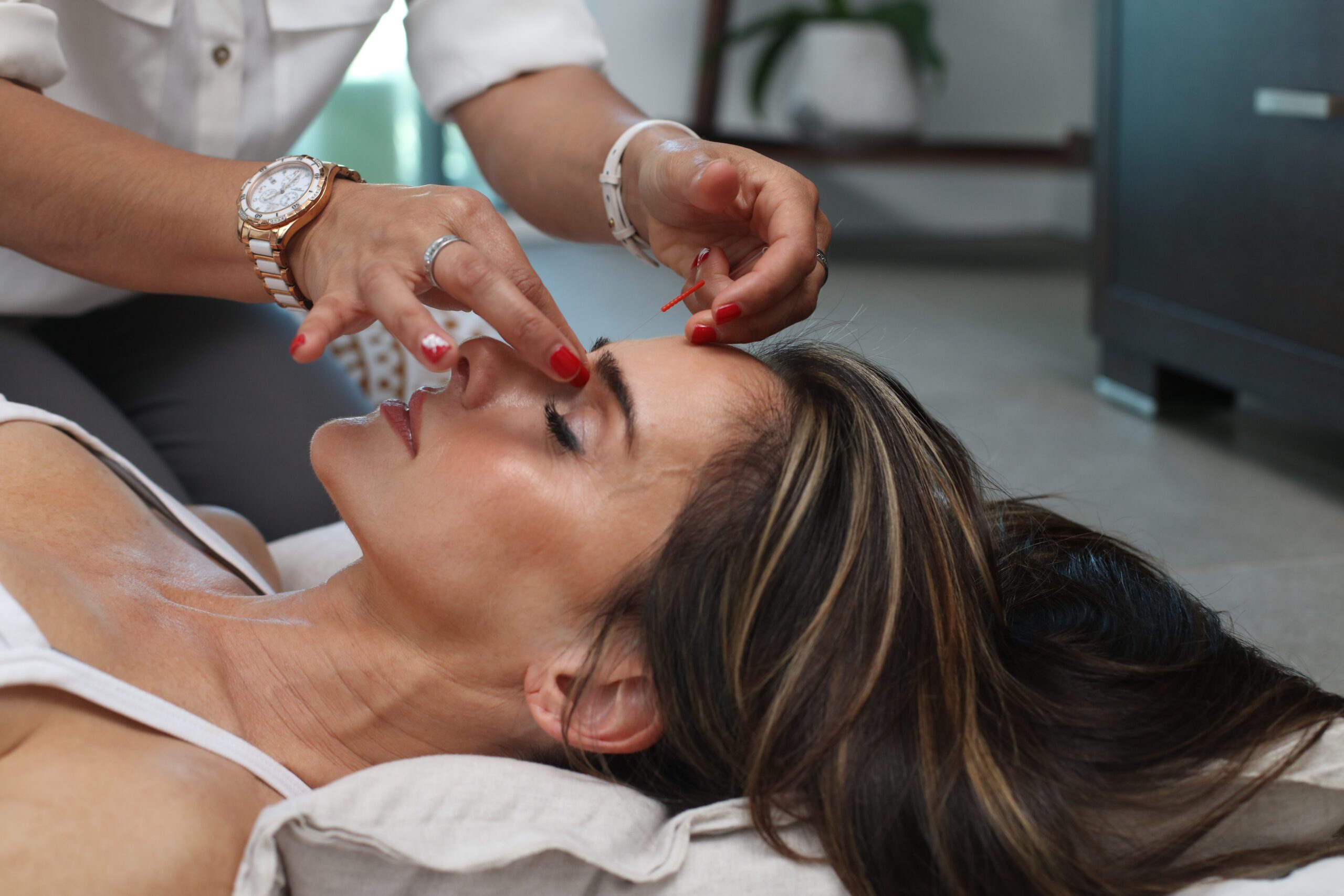Acupuncture
Services
Acupuncture is a method of encouraging the body to promote natural healing and improve function. This is done by inserting sterilized, stainless-steel needles (that are as fine as a human hair) into specific points located near or on the surface of the skin which have the ability to alter various biochemical and physiological conditions in order to treat a wide variety of illnesses

What problems are commonly treated with Acupuncture? Does it hurt?
Acupuncture is generally safe when done by appropriately trained practitioners using clean needle technique and single-use needles.
Acupuncture needles are 25-50 times thinner than a hypodermic needle. They are so thin that several acupuncture needles can go into the middle of a hypodermic needle. There is little sensitivity to the insertion of acupuncture needles.
While some people feel nothing at all; others experience a brief moment of discomfort as the needle penetrates the skin that can be followed by a mild sensation of cramping, tingling, numbness, traveling warmth, or heaviness. The needles are left in place for twenty to forty minutes. Most people find the experience extremely relaxing and uplifting and even fall asleep for the duration of the treatment.
It is common to experience soreness during and after an acupuncture treatment. It is important to let your acupuncturist know immediately so that they can make you more comfortable. If you are sensitive to acupuncture or ‘needle-phobic’ your acupuncturist can use thinner needles and be gentler. Be sure to speak up and let the practitioner know how you are feeling!
The world Health Organization(WHO) lists a wide variety of disease or disorders for which acupuncture therapy has been tested in controlled clinical trials.
-
Pain – Arthritis, neck pain, shoulder pain, back pain, sciatica, Twisted ankle, Carpal tunnel syndrome, Tennis elbow, Rheumatologic conditions (eg. osteoarthritis and rheumatoid arthritis), Neuralgia, Bursitis, Tendonitis, Headaches, Migraines, Muscle Spasms, Sprains
-
Gastro-intestinal disorders (irritable bowel syndrome, chronic constipation, diarrhea, ulcers, gastritis, abdominal bloating)
-
Psychological problems (insomnia, anxiety, depression, stress)
-
Gynecological conditions (pre-menstrual syndrome, dysmenorrhea, endometriosis, infertility, and menopause)
-
Respiratory conditions (asthma, bronchitis, chronic coughs, allergic rhinitis and sinusitis, cold and flu
-
Chronic fatigue syndromes, Hypertension, Diabetes and complications, Cancer,
-
Stroke paralysis, Facial palsy, Peripheral neuropathy
Bundled Services
Depending on your condition, a combination of services may be recommended.
Examples of some combinations are;
Acupuncture & Firecupping
Acupuncture & Cupping
Acupuncture & Chinese Massage (Tuina)
Acupuncture & Craniosacral Therapy
You can aslo combine Chinese herbs medicine with any of these services.
Frequently Asked Questions
Learn How it Works!
What is Acupuncture?
Acupuncture is a method of encouraging the body to promote natural healing and
improve function. This is done by inserting sterilized, stainless-steel needles (that are as fine as a human hair) into specific points located near or on the surface of the skin which have the ability to alter various biochemical and physiological conditions in order to treat a wide variety of illnesses.
What problems are commonly treated with Acupuncture?
The world Health Organization(WHO) has identified the benefits of acupuncture in the treatment of a wide range of medical problems.
Pain
Neck pain, shoulder pain, back pain, sciatica, twisted ankle, carpal tunnel syndrome, tennis elbow, arthritis, neuralgia, bursitis, tendonitis, headaches, migraines, muscle spasms and sprains, fibromyalgia, TMJ
Gastro-intestinal disorders
Irritable bowel syndrome, chronic constipation, diarrhea, ulcers, gastritis, abdominal bloating.
Psychological problems
(insomnia, anxiety, depression, stress)
Gynecological conditions
PMS, PCOS, dysmenorrhea, endometriosis, infertility, and menopause
Respiratory conditions
Asthma, bronchitis, chronic coughs, allergic rhinitis and sinusitis
Nerve system conditions:
Stroke paralysis, facial palsy, peripheral neuropathy, MS. Chronic Fatigue Syndrome, Cancer, Diabetes, Vertigo and Dizziness.
Does acupuncture hurt?
Acupuncture needles are 25-50 times thinner than a hypodermic needle. They are so thin that several acupuncture needles can go into the middle of a hypodermic needle. There is little sensitivity to the insertion of acupuncture needles.
While some people feel nothing at all; others experience a brief moment of discomfort as the needle penetrates the skin that can be followed by a mild sensation of tingling, numbness, traveling warmth, or heaviness.
Most people find the experience extremely relaxing and uplifting and even fall asleep for the duration of the treatment.
It is common to experience soreness during and after an acupuncture treatment. It is important to let your acupuncturist know immediately so that they can make you more comfortable.
If you are sensitive to acupuncture or ‘needle-phobic’ your acupuncturist can use thinner needles and be gentler. Be sure to speak up and let the practitioner know how you are feeling!
Are there any side-effects or risk to the treatment ?
Acupuncture is almost zero side effects. But people with pacemakers should avoid electrical acupuncture. Also let your acupuncturist know, if you are pregnant.
Are there any other techniques that do not use a needle during acupuncture treatment session?
We also provide acupunpressue, electrical stimulation or laser stimulation.
What is cupping ?
Cupping is one kind of ancient therapy that cup improves qi and blood circulations, and
dispels stagnation by sucking cups on the skin of back, neck, shoulder and other area of body.
Cupping has been used for thousand years in fighting diseases and injuries. In ancient time, people in Asian and Europe found that effectiveness of cupping when they fought with diseases and injuries.
Over time, cupping therapy has spread into all over the world. Cupping is used to treat respiratory diseases (such as common cold, pneumonia and bronchitis), arthritis, fertility and gynecological disorders, and skin problems (eczema, acne).
It is claimed to help general physical and psychological well being and pain management.
Schedule an appointment!
Contact us to schedule an appointment!
Email Address
Call Me
Visit Me
3404 Roblin Boulevard Winnipeg Manitoba R3R 0C7 Canada

